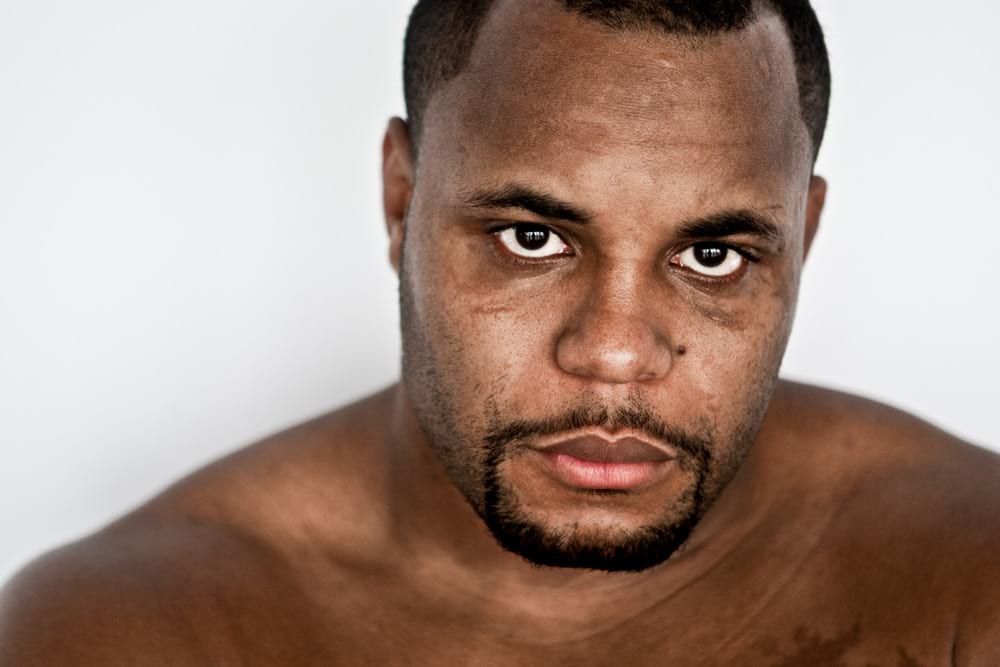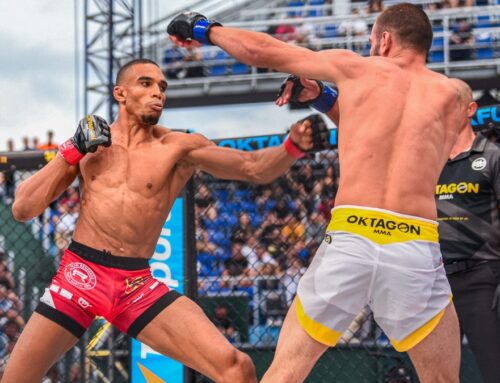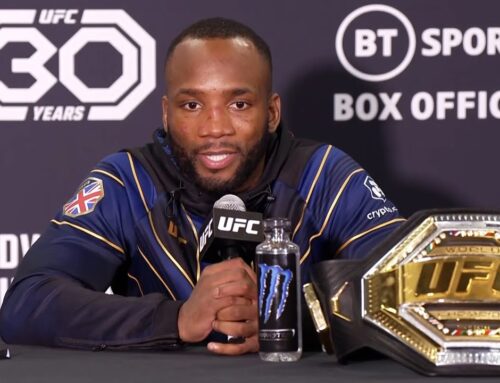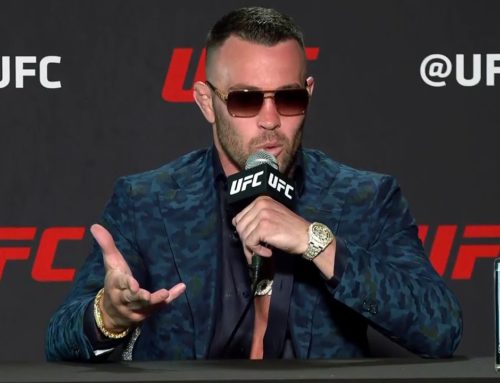Jon Jones’ UFC 214 redemption was secured by a kick to Daniel Cormier’s head and defined by waterworks and apologies. First, Jones, the victor, apologised for going off the rails and lately being more Hyde than Jeykll, and then Cormier, the opponent on the receiving end of Jones’ foot, apologised for getting whacked in the skull and somehow letting people down. Finally, Joe Rogan, the commentator responsible for reminding a concussed and crying Cormier of his fate, later said sorry for giving the dethroned UFC light-heavyweight champion his moment on the microphone when all he needed was a tissue, a hug and some medical assistance.
“If you win both fights,” said Cormier, “there is no rivalry.”
Accompanied by tears and a quivering bottom lip, these were the immediate thoughts of a former champion whose senses were scrambled after playing his part in one of mixed martial arts’ great rivalries. It was, because of this, one of the saddest and realest statements a beaten fighter has ever issued post-fight and succinctly showed how much a loss means to a competitor whose primary reason for competing is to be the best.
No, Rogan probably shouldn’t have requested words from a fractured mind, but, in a way, I’m glad he did because Cormier’s disappointment managed to restore my faith in competition at a time when fight sports, especially at the elite level, are in grave danger of becoming ruled not by competition but faux hate, entertainment and performance.
Case in point: a couple of hours before Cormier was kicked and KO’d by an opponent he hates more than cutting weight, boxer Adrien Broner was pouting and preening his way to a cosy, lopsided decision loss to Mikey Garcia in New York. Once a hot prospect with the world at his feet, Broner is now a 28-year-old man-child content to pout and preen, so long as he gets paid. It’s why he seemed unconcerned when his latest bout approached its conclusion and he’d hardly won a round. It’s also presumably why he smiled when exiting the ring. It was his third career loss, a setback in the real world, but, for a man who goes by the nickname ‘About Billions’ and prides himself on a Mayweather-lite reputation for flaunting cash and making dumb decisions, that’s a minor detail. Cartoon character more than champion, Broner has sacrificed authenticity and competition in favour of talking s**t and getting paid.
Chances are, we’ll see something similar in Las Vegas on August 26, when Conor McGregor, a UFC champion in two weight classes, gets outboxed and beaten up by a great boxer, Floyd Mayweather, in a boxing ring. Make no mistake, the Irishman will try to win. He will give it a go. But he will, in the end, lose, at which point he’ll say he gave it his best shot, invite Mayweather to a return in an Octagon, and then soothe the pain of defeat by remembering the finer details of the astronomical paycheck set to land in his bank account.
Defeats, you see, hurt most of all when there’s a desperate need to win. Conor McGregor, like Adrien Broner, has no desperate need to win – which, in this case, is just as well – and therefore the competition aspect of his upcoming ‘fight’ needs to be taken with a sizeable pinch of salt. It’s not just him. It’s not just them. Frankly, the majority of fights at the upper end of the pay pyramid are liable to lose their bite. “It’s hard,” Marvin Hagler once said, “getting out of bed at five o’clock in the morning when you’re wearing silk pyjamas.” A wise head, Hagler didn’t get out of bed; he got out of the sport. So many others, though, in boxing and MMA, stick around. Not only that, they milk this thing – the broad idea of a fight – for all it’s worth, not really caring, nor it mattering, whether they actually win or lose.
Thank you Joe Rogan, then, for inadvertently letting Daniel Cormier restore my faith in the truth of combat sports and reminding us all of what a defeat means to a champion at the very top of his game, someone paid a reported one million dollars for thirteen minutes of action. Yes, it was distressing to see Cormier reduced to a dejected mess of meme-worthy facial expressions (Michael Jordan, stand down), but it was also refreshing to discover just how much it hurt. To get that insight. To feel his pain. Because, for Cormier, in that moment, the payday was inconsequential. It meant nothing. All he was able to process was the fact he had lost again to Jon Jones, a man who had festered inside his head since first beating him two years ago. He didn’t even know how he’d lost. He just knew he’d lost. The day before he was UFC champion, the model citizen to Jones’ “f**k up”, and now, twenty-four hours later, his world had crumbled and he faced the horrifying prospect of living the rest of his life having never defeated his archenemy.
But fight sports, in order for them to make sense, and in order for there to be unrivalled drama, have to be about these extremes. The highs need to be higher than any available elsewhere and the lows need to be as close to rock bottom as a professional athlete can possibly get. Otherwise, if this isn’t the case, what’s the point? Why else would we happily watch two human beings beat the s**t out of each other?
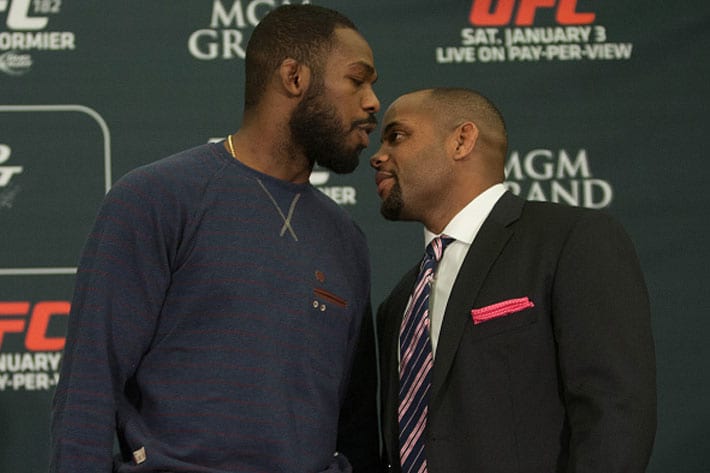
Jon Jones, the winner, did his thing, of course. A chameleon, he transitioned from the maverick who didn’t give a f**k, who all of a sudden embraced his inner bad guy, to Cormier’s shrink and shoulder on which to sob. He wanted to make it right; he wanted to cheer him up. Not only a savvy PR move, for it instantly made a hero of Jones, it was also a move synonymous with fighters who prevail in so-called grudge matches and then use their newfound bragging rights to be the bigger man and patch things up. Sensible. The done thing.
Whether Cormier, 19-2, chooses to accept the olive branch or not remains to be seen. What’s clear, though, is this will be no ordinary loss for a 38-year-old unfamiliar with the concept of defeat. You could tell that much just from looking into Cormier’s eyes and listening to his words. How much it meant. How much it hurt.
It was a reminder, also, of how authentic the Jones vs. Cormier rivalry – yes, rivalry – was during a period when everything else seems so manufactured, groomed and preplanned. Once as real as it gets, mixed martial arts, and combat sports in general, have recently allowed fantasy and fakery to become part of its fabric, yet The Jones & Cormier Show represented a throwback, a palate cleanser. It possessed a legitimacy – a meaning – a lot of competing products lack. Real hate. Real competition. Real rivals. Real emotion and story. Winning and losing actually mattered to these men; money was secondary.
Which is why, if it is to be The End, and Cormier no longer sees himself as Frazier to Jones’ Ali, it will be a crying shame, not only for DC, but for us all.

